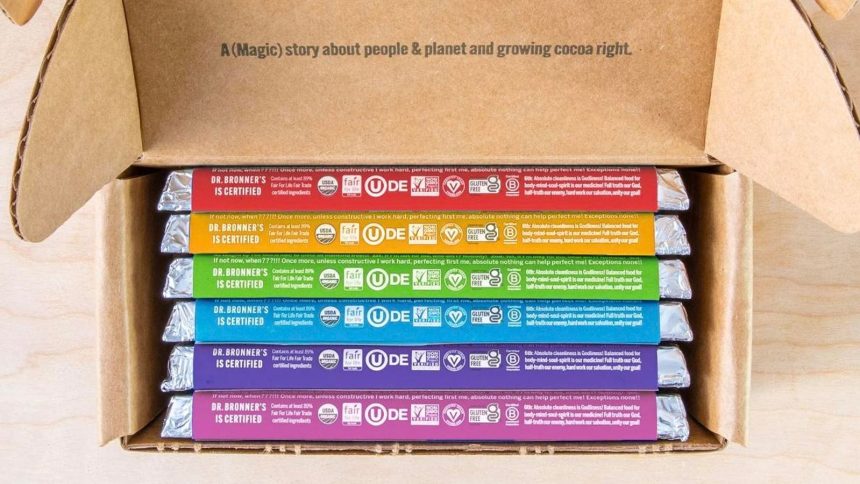In an increasingly eco-conscious marketplace, several brands are making notable strides in regenerating soils, farms, and communities through their products. As consumers seek gifts that have a positive impact on the planet, these innovative companies stand out by incorporating regenerative practices into their sourcing and production methods. This summary highlights some inspiring brands that are contributing to a healthier environment while offering gift options that merge sustainability with quality.
Dr. Bronner’s is well-known for its soaps, but its recent foray into regenerative chocolate bars showcases its commitment to ethical sourcing. These vegan, gluten-free chocolates are crafted from cacao grown by farmers in Ghana using regenerative organic practices. By collaborating with local producers, Dr. Bronner’s supports fair trade and the environment while providing a delectable treat. The inclusion of Indonesian coconut sugar, Congolese cocoa butter, and Madagascan vanilla bean enhances the quality of these chocolate bars, making them not just a gift of love, but a step toward regenerating the planet.
Farmer’s Gin also represents a noteworthy example of regenerative practices in the beverage industry. Sourced from Idaho grains cultivated by Tim Cornie at 1000 Springs Mill, this gin prides itself on using certified Regenerative Organic wheat. Distilled at the first certified organic distillery in the U.S., Farmer’s Gin goes beyond merely producing an exceptional spirit; it symbolizes a shift towards regenerative agriculture in American soil. Whether served as a hostess gift or enjoyed during a gathering, this gin inherently supports farming practices that nurture the land and promote sustainability.
Fashion retailer Anthropologie has joined forces with Kiss the Ground, a nonprofit leading the regenerative movement in agriculture, committing to sourcing 100% of its directly-sourced cotton responsibly by 2027. The integration of regenerative cotton into their clothing line signifies a substantial step toward sustainable fashion, with products that not only contribute positively to the ecosystem but also look stylish. Their selection features various options made with certified regenerative cotton, affirming that fashion can be both chic and conscientious.
Outerknown, a surf-inspired brand, emphasizes the use of natural materials in its products and has made strides to incorporate 100% Regenerative Organic Certified cotton in its Journey Jacket. This jacket exemplifies durability and style while aligning with regenerative agricultural principles, making it a fashionable and sustainable choice for consumers. Similarly, Terra Thread, a California-based company, merges daily utility with sustainability through its organic cotton backpacks and accessories. It emphasizes fair trade practices and contributes to Feeding America, thus intertwining functionality with philanthropy.
In the realm of food, Heirloom Coffee Roasters stands out with its ROC™ certified coffee sourced from Cooperativa Sacacli in Nicaragua, a cooperative championing gender equity among its members. By focusing on sustainable farming practices combined with social equity, this coffee brand exemplifies a commitment to regenerating agricultural communities while delivering exquisite flavors. Meanwhile, Enzo Olive Oil, based in California, practices regenerative agriculture in its olive groves, promoting biodiversity and environmental stewardship. Their olive oils are not only flavorful but also beneficial to the ecosystem, showcasing how culinary delights can nurture both the palate and the planet.
Lastly, brands like Jacobsen Salt Co. are fundamentally evolving traditional practices by adopting more sustainable methods in their production. By utilizing technologies that minimize environmental impact and investing in renewable energy sources, they demonstrate how even small-scale operations can contribute to ecological sustainability. Products from Maggie’s Organics feature ROC cotton in classic styles like fleece joggers, portraying that comfort and care for the environment can go hand in hand. This marriage of style, sustainability, and social responsibility resonates with consumers looking to make ethical choices, encompassing a movement toward a more regenerative world.
In essence, these brands illustrate the potential of thoughtful consumerism to drive positive change. By gifting products from companies committed to regenerating soils and communities, consumers can make choices that extend beyond individual benefit, contributing to the health of the planet and its people. Each of these brands exemplifies a commitment to sustainability in their unique ways, forging a collective path toward regenerative practices in various industries.



